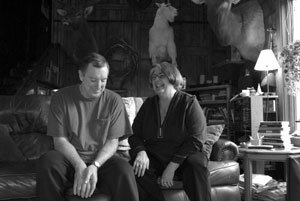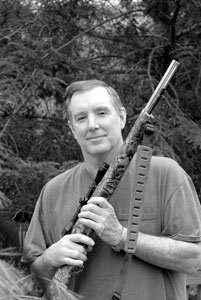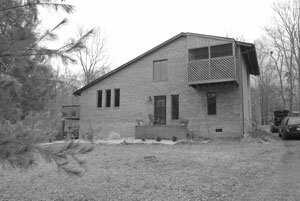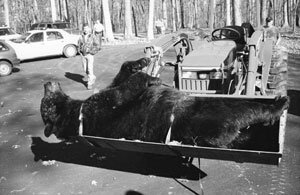600-pound black bear: 'It sounded like it was tearing my arm off'

It was just before dawn on Friday, November 17, and Thurman Hensley's life was about to change. Making his way over the rocky terrain and thick patches of mountain laurel of his 250-acre property bordering the Shenandoah National Park, the seasoned hunter and expert marksman tracked his prey.
Then, at 8:30am, with the sun shining brightly on the cool fall day, Hensley finally spotted his mark. He raised his muzzle loader, took aim, and fired the gun's single round. Through the cloud of smoke, the 60-year-old saw the animal lurch as his bullet penetrated its torso behind the shoulder.
It could have been a fatal shot. But rather than fall, the massive creature lumbered off into the woods with Hensley close behind, determined to snare a prize kill and put the wounded animal out of its misery. An hour later, however, Hensley, now unarmed, found himself fighting for his own life, locked in a bloody battle to the death with Virginia's largest mammal.
Thurman Hensley discusses the attack by a 600-pound bear.
Bears ascending
Five years ago, the resort community of Fallsburg, about an hour upstate from New York City, was rocked when when a vacationing toddler from Brooklyn was plucked from her stroller and killed by Ursus americanus, the American black bear. Attacks by black bears are rare– just 45 have been recorded since 1900. And according to the state's Department of Game and Inland Fisheries, Virginia– despite thousands of bears roaming its forests– has never recorded an unprovoked attack on a human.
Dave Steffan, the Department's forest wildlife program manager, says bears spend their time scavenging for nuts, berries, and insects– and also occasionally eating smaller woodland creatures. Calculations from the bear "harvest"– the number of bears killed each season– indicates that their numbers are rising. In 2005-2006, 1,439 bears were killed statewide; the number jumped to 1,633 this season.
The typical adult black bear weighs between 175 and 400 pounds, Steffan says. But there was nothing typical about the bear Hensley was tracking.
Bear lovers, bear killers
At first impression, Jennifer and Thurman Hensley are an unlikely pair. His home office features a gun safe, camouflage hunting garb, and countless orange caps. In the living room and kitchen, trophy heads from his hunts– bear, deer, elk, even a white mountain goat– hang from every wall along with dried skulls and bear paws.
She, however, sports a "That was Zen, this is Tao" bumper sticker on her PT Cruiser and teaches Taiji and Qigong– eastern movement and healing practices– from a studio inside the lodge style home the couple built nearly 30 years ago near the tiny town of Grottoes in northeast Augusta County. But Jennifer finds the couple's seemingly diverse interests quite compatible.
"Everything we do comes back to a love for nature," says Jennifer, who says that when they began dating in ninth grade, her future husband was supplementing income from his grocery store job by trapping animals for fur. "We were deer hunting when JFK was shot," Jennifer recalls.
"If I'm going to eat meat, I'm going to be responsible for where it comes from," she says. "We don't go to the store and buy hamburger. We have deer burger or bear burger."
Mounting the trophies is a sign of respect for the animal's spirit and sacrifice, adds Jennifer, who says she has Native American ancestry. "I never enjoyed the kill," she explains: for the last several years she has entered the woods armed only with a camera.
Thurman Hensley, however, is not apologetic or shy about his passion for all aspects of the sport. "I enjoy the kill," he says. "I won't ever say I don't, cause I do." And he admits that the trophies hanging in their house are a "boasting right." But he insists those admissions don't conflict with his respect for the animals he hunts, and he has nothing but disdain for people who hunt illegally. Hensley says he has spent countless hours over the last three decades creating a wildlife sanctuary on his property.
Surrounded by woods, their home is a frequent stop-off for the animals that live around them, and the couple say they enjoy watching the bears during the year. They chuckle recalling cubs they've seen playing nearby and nosy bears they've shooed off their porch.
When he noticed that bears were frequently being hit by cars on nearby Route 340, Hensley dug several ponds to provide the bears with water so they wouldn't have cross the road to reach a river. When he and Jennifer hear or see poachers on their property, they call the authorities immediately.
But one bear in particular caught Hensley's attention over the last several years: "the biggest bear I've ever seen," he says.
"Not many people could hunt a bear like that," he explains. For three years he tracked the bear, hoping to bag it with a bow and arrow– his preferred hunting method. But although he spotted it on several occasions, he never had a clean shot. This year, although he saw 17 other bears during the season, he let them pass "'cause you only get one," he says.
Virginia law allows each hunter to take only one bear per season, and each carcass must be checked at an official station. (Laws prohibit hunters from shooting females accompanied by cubs, and all bears under than 100 pounds are also off limits.)
In addition to the challenge of hunting a big bear, Hensley had another reason for targeting this particular animal: safety.
"This bear was not afraid of human beings," he says, recalling a staring match he had with the creature as it passed under a tree stand earlier this year before hunting season began.
"It had hate in its eyes," he says. "When that happens, you're in trouble, because the only thing that saves man from bear is that it's afraid of you."
Jennifer says something else set the stage for tragedy as well: "The bear had lost its fear, but Thurman had lost his fear of the bear."
And so when bow hunting season ended with no sign of the bear, Hensley decided to take his chances with his muzzle-loaded rifle.
Tracking a wounded animal
Like the guns carried by cartoon characters, a muzzle loader is an old-fashioned firearm, though most used today are not antiques. It must be loaded by hand with gunpowder and bullet. And after each shot, reloading can take up to a minute, a long time when the hunter suddenly becomes the hunted.
As Hensley began tracking the bear he had shot that November morning, another hunter was waiting and watching high above the ground. Soon after hearing the shot, he saw a sight that shocked him.
"A huge bear came by," recalls Tim Cass, Hensley's neighbor, who was hunting with his 19-year-old son, Nicholas, from a tree stand. "It looked like it was 800 pounds." Cass says that in addition to its unbelievable size, the bear was acting strangely. "It kept sitting down, laying, sitting," he says.
Cass had already killed his one allotted bear for the season that morning, so he remained in his stand.
About 45 minutes later, Hensley came past, and Cass joined the pursuit, making their way through mountain laurel so thick that in places the trio had to crawl on their hands and knees before they spotted the wounded bear. "It was laid down," Cass says.
Both he and Hensley fired their weapons, but even those shots didn't finish the job, and when the smoke cleared, the bear was gone. And so was their ammunition.
Both men had left their packs with extra ammo by their tree stands, so Cass used a radio to ask his son and his son-in-law, Curtis Barton, who were hunting nearby, to bring more. Re-armed, Hensley, Cass, and Barton continued the hunt. Nicholas, who'd lent his gun to his father, stayed behind.
There were signs that the bear wouldn't go far– "There was a lot of blood," Cass says– and before long, the hunters had another chance to kill the bear. Hensley, walking about 10 yards ahead of the other two, spotted the wounded animal lying in close range under some laurel, took aim, and shot it in the head. "The bear started rolling, moaning, roaring," Cass recalls.
He and Barton also fired their weapons. One shot to the head might have killed an ordinary bear, but this creature's massive size afforded it some protection from the bullets, and game wardens later estimated the seven-foot-tall bear's weight at about 600 pounds. According to VDGIF spokesperson Julia Dixon, the largest black bear on record was 720 pounds and was shot in the Suffolk area. Jennifer believes Hensley's bear might have been closer to that size, but it was never weighed. And while a typical black bear carries an inch of fat under its skin, this bear had a full five inches of fat that absorbed much of the bullets' impact, say the hunters.
"That is above normal," says Steve Morgan, owner of Appleberry Mountain Taxidermy in Schuyler. He handles about 30 to 40 bear carcasses a year, most under 300 pounds. At a nearby bear check station, The Gun Shack in Verona, Jordan Coffman says he's never seen a bear that size. "The biggest bear we've weighed is 180 pounds," he says.
More than three times that size, Hensley's target leapt out of the laurel. From 10 yards away, Cass says, he watched a "horrific" scene unfold. "When it came out, it spun to the right," he remembers. "Thurman was in the bear's path. It took its paws and laid him out, started chewing him from the feet up. He was screaming, 'Get it off me! Get if off me!'"
Gentle giants
The Game Department's Steffan says larger bears are not inherently more aggressive: "They don't get old and big unless they've figured out how to avoid people for their life."
That, however, is not to say bears can't be dangerous. "They're big and strong," Steffan says, "and once they become habituated to humans, whatever fear they have naturally goes away. If they see people as a source of food, that's when we get concerned."
That became fatally apparent in a 2005 documentary, Grizzly Man, whose doomed protagonist Timothy Treadwell treats Alaskan grizzlies as his friends. The dangers of human-bear interaction became apparent last year at Maymont Park in Richmond when a four-year-old boy offered a treat through a fence. After one of the park's two black bear nipped him, Health Department officials controversially decided to euthanize both animals so their brains could be tested for rabies.
The affection many people feel for the reclusive animals led over 300 mourners to pack the bears' memorial service on February 25, 2006. "It feels like a Mafia hit," wrote Times-Dispatch columnist Ray McAllister.
But despite their generally gentle natures and their "teddy bear" reputation, keeping the bear population in check is a necessity, says nature expert Marlene Condon, who points out that bears have no natural predators except humans.
And not all bear hunters abide by the rules. In 1999, Operation SOUP (Special Operation to Uncover Poaching) led to the arrests of 19 people around the Shenandoah National Park. Nine of them were charged with violating the Lacey Act, a federal law that prohibits the sale of wild animals' body parts. Sales of bear parts are particularly lucrative in Asia, where their gallbladders– considered an aphrodisiac– can fetch up to $1,000 per ounce, more than the price of cocaine. Approximately 300 galls were recovered during the 1999 operation, in addition to claws and furs. Another Virginia poaching sting, Operation VIPER, was operated out of a fake bear-checking station in Elkton and yielded more than 100 arrests for illegal bear harvesting in 2003-2004.
Part of the problem is that states have inconsistent laws, says Mike Markarian of the Humane Society of the United States. While it's illegal to sell any bear parts in Virginia, other states allow it, so Virginia bear parts can be smuggled over state lines to be sold. Some eventually make it onto the black market.
Markarian says his organization is hoping the Bear Protection Act will be reintroduced and passed this year. That federal bill, which received bipartisan support in both the U.S. House and Senate in 2002, prohibits the import, export, and interstate commerce in bear gall bladders and bile.
"Tearing my arm off"
When Hensley saw the bear charging, he turned to run. But the bear reached him in seconds, knocked him down, and tried to turn him over. It chomped through his knee and bit out his inner thigh. When the bear flipped him to his back, Hensley stuck his gun crossways in its mouth to keep it from reaching his head and throat, and the gun broke one of the bear's canine teeth and its jawbone. When the maddened creature wrenched the gun out of his hands, Hensley put his left forearm into the bear's mouth in an effort to protect his face.
Nearby, Cass and his son-in-law watched in horror.
"I look at my son-in-law and say, "Oh my f***iing god,'" Cass recalls. "We went over there and started beating the bear on the head to get him off Thurman.
"I was hitting that bear with everything I had," says Cass, 47, a weightlifter. "I beat and beat and beat on that bear. It broke my gun all to pieces."
When Hensley couldn't free his arm, he headbutted the bear, breaking his own nose in the process. He then grabbed its mouth with his right hand. The bear's teeth ripped through his tendons, and nearly tore his hand in half. Cass and Barton kept bashing their guns over its head, but the bear seemed oblivious to their assault and continued mauling Hensley.
"You could hear popping bones and just crushing," says Cass, "like he was chewing a big old bone."
The bear finally turned its attention to Hensley's rescuers and chased them down a hill. But, weakened by blood loss, it finally retreated uphill into a stand of mountain laurel.
Cass and Barton went back up the hill to try to rescue Hensley.
"You could see his skull, the front of his forehead," Cass recalls. "He had a hunting suit saturated with blood like a sponge– I thought he was going to bleed to death."
But before Cass could help the still-conscious Hensley, the bear returned once more, and Cass and Barton ran, with the bear in close pursuit.
With the bear distracted, Hensley– despite his massive injuries– rolled into a nearby patch of mountain laurel. And when the bear returned to him, the scent of the blood on the ground where they'd fought– his own and the bear's– may have confused it, and it lumbered away.
Hensley managed to get to his feet and stumble down the mountain to find Cass.
"It was almost like the walking dead," says Cass, stunned to see Hensley upright and moving. "It's hard to explain how bad it really was."
Cass had radioed his son to go get the four wheeler and call for help. The men loaded Hensley, who was rapidly going into shock, onto the four-wheeler and raced to Cass' house. There, thanks to Cass' son who'd made the call, the rescue helicopter ambulance Pegasus was waiting to carry him to UVA Hospital.
Deja vu
In his nearly 50 years of hunting, Hensley has had numerous hunting mishaps.
In the early 1980s, a friend mistook him for a turkey and peppered his upper body, including his face, with buckshot. A few years ago, he fell from a tree stand and broke his back. He once got lost in a blizzard in Montana and had to hike 30 miles to find help. And on two other occasions, he was attacked by bears– one, an angry mother protecting her cubs, and the other a male trying to pull Hensley down out of his tree stand. He escaped injury both those times.
This time was different.
At home making stew on the morning of Hensley's attack, Jennifer says, she initially laughed off Cass' call as a prank. "They're always pulling stuff like that," she says. When she asked Cass how big the bear was and he told her more than 600 pounds, she hung up on him. "Yeah, right," she thought.
But when Cass' son-in-law called back a few minutes later, his voice shaking, she realized this time was different and raced over Afton Mountain. Hensleys' daughter, Shea Willis, also soon realized the seriousness of her father's situation. "The word 'airlifted' knocked the wind out of me," she says.
Arriving at UVA Hospital's emergency room, Willis, 39, says she couldn't believe what she saw. "The room was covered in blood. He was tore up."
Hensley was wheeled into surgery while family and friends filled the waiting room, anxiety rising during the seven-hour life-saving procedures. "They couldn't tell us the extent of the damage," says Willis. "We didn't know if he'd come out with all his limbs, if he had head, neck, or brain injuries or what."
For about three weeks "it was touch and go," says Willis. Doctors told the family that Hensley might suffer organ failure. Jennifer Hensley says that from the moment she arrived at the ER, she began administering the eastern medicine techniques she practices. "I started cranking the Qi into him because he looked like he needed it," she says. She and Hensley believe the combination of eastern and western medicine allowed him to recover more quickly than doctors ever expected.
There were setbacks, however. Hensley's femoral artery burst in the week after the attack, and he almost bled to death, says Willis. Amazingly, despite the bear having bitten through bones, Hensley never contracted a systemic infection, which can be fatal. But doctors frequently had to cut away dead or infected flesh from inside his wounds. Remembering the pain of those procedures, Hensley now shakes his head and says, "You just don't know...."
Two weeks and over a dozen surgeries after the attack, Hensley went home to finish healing. But in some ways, says Willis, the next two months were tougher on everyone than the early days.
"Learning to live with something long term has been a lot harder," she says, "than walking into the ER and seeing him in little pieces."
Sympathy and anger
Though the Hensleys say that in the months since the incident, they've received tremendous support from friends and strangers, they've also dealt with negative comments and criticism. Initial media accounts of the attack alleged that Hensley approached the bear thinking it was dead. Jennifer recalls in particular a blog post on ESPN.com that made light of the incident: "Memo to all muzzle-loading rifle hunters: Before approaching a 600-pound black bear you've just shot, it might be a good idea to reload your gun."
"It made him sound like an idiot," Jennifer complains.
Willis also resents people making assumptions about her father.
"The most important thing to me is that people understand that it wasn't stupidity that got him in this spot," says Willis. "It wasn't inexperience, and he wasn't looking for a thrill."
Other comments were vitriolic, however. Some anonymous letters expressed disappointment that the bear hadn't, well, finished the job. While most mainstream hunting foes regret the harm that came to Hensley, they express sorrow that anyone would want to destroy such a magnificent creature.
"Here I look at it as a thing of beauty in the woods," says wildlife rehabilliator Suzanne Whedon. "Hunters come in and see it as a target. They need to be treated with respect."
Willis comes quickly to her father's defense.
"My dad has a lot of respect for these animals," she says. "He knew it was up there, and he felt it's the time to take this animal down. He could have let it die somewhere afer he'd shot it, but he'd never do that in a million years. A man of lesser character probably would have, because the thing was huge."
Bear demons
Anyone who wondered whether Hensley would ever hunt again got an answer almost immediately. Two weeks after he returned home, Hensley was back out in the woods hunting deer.
"The mountains are his life," says Willis.
But he's haunted by the attack. "It sounded like it was tearing my arm off. I could feel everything," says Hensley, dismissing rumors that adrenaline cloaks the pain. He's had nightmares, and little things can revive the terror.
"He can't stand hearing the dog chewing on a bone," says Jennifer, who removed a painting of a large bear head from above their bed.
In addition to his gratitude to the teams of doctors and nurses who saved his life, Hensley says he's indebted to Cass and his son-in-law, who beat the bear away from him. "Those two boys saved my life," he says. Jennifer says she hasn't figured out how to show her appreciation. "What do you say, "Thanks for saving my husband's life?" It doesn't seem like enough.
Though the psychological scars may take longer, Hensley's physical recovery has surpassed anyone's expectations, Jennifer says– everyone's except his own. "I had no intention of losing this leg," he says. "Every day I said I was going to do something different."
He still undergoes physical therapy several times a week, and is now able to walk without a cane. He says he has regained 80 percent use of his hand and 50 percent of use of his leg. He stopped taking powerful prescription painkillers, but numbness still lingers along his head where the bear nearly scalped him.
Though the wound on his inner thigh is still healing and may need to be operated on again in the near future, Hensley's optimistic about his hunting future. He's planned an expedition to Wyoming in September to hunt elk, and when asked if he'll go after another bear, he doesn't hesitate: "Absolutely," he says.
But he'll be better prepared. On the day of his attack, Hensley had a folding knife in his pocket, and during the attack he could reach it, but he couldn't open it. From now on, he says, he'll carry a straight blade. And he'll make sure he has plenty of ammo at all times.
Though the bear's head was sent to Richmond for rabies testing, the hide was preserved, but, "I haven't been ready to see it yet," he says.
One thing he and Jennifer regret: that the bear's meat went to waste because they were too focused on Hensley's injuries to ensure it was properly cut and stored. It's the first time they haven't used the meat from an animal they have killed, and it saddens both.
As for the fact that the bear nearly took his life, Hensley isn't angry.
"It was just doing what a bear does," he says.

Thurman Hensley
PHOTO BY JEN FARIELLO

High school sweethearts, Thurman and Jennifer Hensley are both dedicated to nature
PHOTO BY JEN FARIELLO

Before retiring from Dupont, Hensley did shift work for more than 30 years to make time for his passion: hunting
PHOTO BY JEN FARIELLO

Wildlife, including bears, make their homes around the house the Henley's built nearly 30 years ago on 250 acres abutting the Shenandoah National Park near Grottoes.
PHOTO BY JEN FARIELLO

At an estimated 600 pounds, the black bear Hensley battled was about three times the size of the average adult black bear.
PHOTO COURTESY THURMAN HENSLEY
#